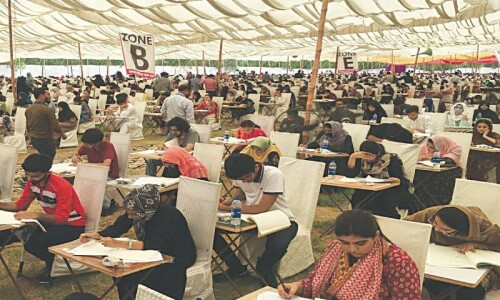 KARACHI, May 29: The lawyers’ movement would not end with only the reinstatement of the deposed judges but would continue to make the judiciary responsive to the public expectations in dispensation of real justice under the law, former Supreme Court Bar Association president Munir A. Malik told a joint general body meeting of the Sindh High Court Bar Association, the Karachi Bar Association and the Malir Bar Association held at the SHCBA hall on Thursday.
KARACHI, May 29: The lawyers’ movement would not end with only the reinstatement of the deposed judges but would continue to make the judiciary responsive to the public expectations in dispensation of real justice under the law, former Supreme Court Bar Association president Munir A. Malik told a joint general body meeting of the Sindh High Court Bar Association, the Karachi Bar Association and the Malir Bar Association held at the SHCBA hall on Thursday.
Mr Malik said that the first phase of the lawyers’ struggle inspired the superior court judges to stand firm with Chief Justice Iftikhar Mohammad Chaudhry and a full bench of the Supreme Court threw out a bogus presidential reference against him. Had the lawyers not waged a struggle, the reference would have been accepted and the CJ removed from his office within a few days.
However, the success achieved by the lawyers was sought to be undermined by the imposition of emergency on Nov 3, 2007, he said, adding that the lawyers continued their struggle, which culminated in the victory of the anti-Musharraf parties in the February 18 polls.
He said that the third phase of the struggle started when the new ruling parties failed to keep their promise with the masses of reinstating the deposed judges. The struggle would now continue till good governance was ensured in the country, he said.
The former SHCBA president and the vice-chairman of the Pakistan Bar Council’s executive committee deplored that the parties that had promised to hoist the national flag at the chief justice’s residence were now trying to complicate matters by introducing a ‘constitutional package’. He said that the legal fraternity would brook no obstacle to the independence and restoration of the judiciary nor accept any curtailment of the CJ’s tenure of office, which extends to 2013. The lawyers have, therefore, decided to place the matter before the people again and seek their verdict through a long march scheduled for June 10.
KBA president Mahmoodul Hasan said that the lawyers were never more united than today, particularly in Sindh. During his recent visit to the interior of Sindh as a member of the Sindh Bar Council delegation, he said, he found the lawyers ‘very enthusiastic’ about the long march. They would never accept any anti-CJ package or superior court judge who had taken the oath under the provisional constitution order of Nov 3, 2007.
The SBC executive committee vice-chairman said that the success of the lawyers’ struggle signified the victory of right over might and of the pen over the sword. He rejected any constitutional package that extended immunity to the violators of the constitution.
SBC member Salahuddin Khan Gandapur said that the US deputy secretary of state should be declared a ‘persona non grata’ in Pakistan because he had been part of a conspiracy to weaken the judiciary in the country.
Advocate Sarwar Mohammad Khan said that an FIR under Article 6 of the constitution should be lodged by the government against President Pervez Musharraf, Syed Sharifuddin Pirzada, Malik Mohammad Qayyum and the judges who took a new oath in violation of the Supreme Court order. Advocate Shahid Kaleem said that the so-called war on terror was a drain on the national economy and Pakistan should review its strategic policy to pursue its national goals.
The lawyers, later, proceeded to the Karachi Press Club to hold a demonstration. The workers of the PML (N), the Jamaat-i-Islami, the Tehrik-i-Insaf and other component parties of the All Parties Democratic Movement (APDM), representatives of various non-governmental organisations and members of civil society participated in the rally. They carried placards, banners and flags and chanted anti-Musharraf and pro-judiciary slogans.
KBA president Mahmoodul Hasan, the secretary-general of Malir bar, Ijaz Bangash, Mohammad Hussain Mehnati and Zubair Khan addressed the gathering in front of the press club.
Meanwhile, the lawyers’ fraternity of the city boycotted legal proceedings at the City Courts and District Courts Malir on the call of the Pakistan Bar Council against the ousting of judges.
The undertrial prisoners were brought to the City Courts lock-up from different prisons. However, their cases could not be heard due to the lawyers’ boycott while the business activities on the premises of the City Courts also remained thin.












































Dear visitor, the comments section is undergoing an overhaul and will return soon.